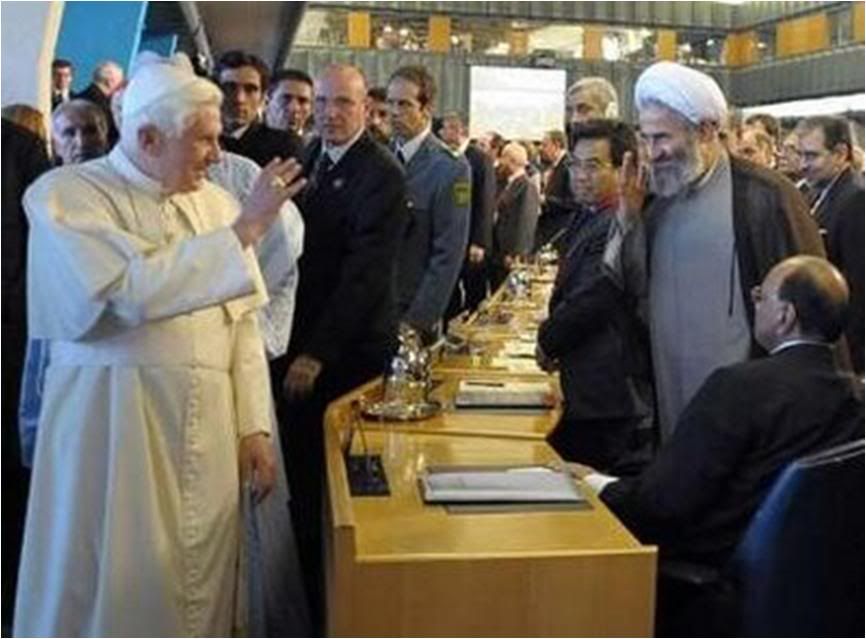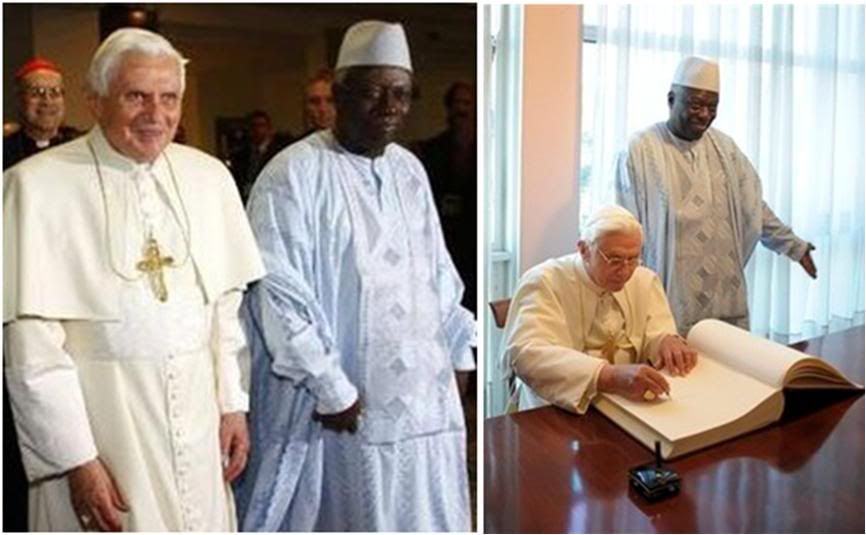 Four hours since the Pope's address - and despite the fact that the English text was immediately made Available - the only English report so far comes from the German agency dpa, whose English translators generally are able to file papal stories before the Anglophone news agencies do.
Benedict XVI says:
Four hours since the Pope's address - and despite the fact that the English text was immediately made Available - the only English report so far comes from the German agency dpa, whose English translators generally are able to file papal stories before the Anglophone news agencies do.
Benedict XVI says:
Greed and speculation, not population growth,
are main causes of world hunger

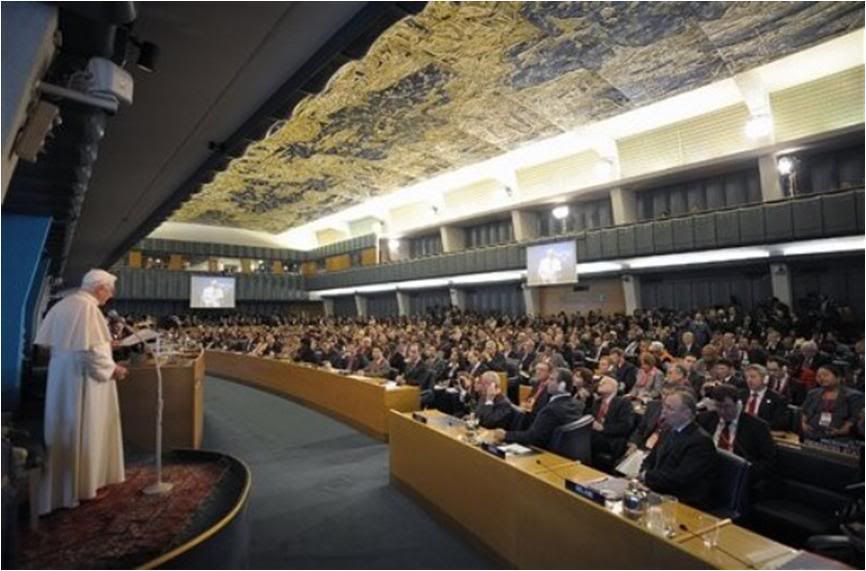
Rome, Nov. 16 (dpa) - Pope Benedict XVI on Monday implored rich nations to do more to eradicate world hunger, stressing that greed and speculation, and not population growth, are the main causes of hunger and poverty.
Benedict delivered the keynote speech at a three-day United Nations food summit in Rome which is being attended by some 60 heads of state and government.
Speaking in French, the German-born pontiff noted that statistics indicate the "earth can produce enough to feed all its inhabitants."
The absence of a cause-and-effect relation between hunger and population growth is proven by the "deplorable destruction of food for economic gain," the pontiff said.
He was apparently referring to the practice by some countries or agricultural sectors, mostly in developed nations, to eliminate their surplus production of food to keep prices up.
Benedict urged a reform of international economic relations and denounced the "greed which allows speculation, even in the cereal market, in which food is placed on an equal footing with other products.
"To combat and achieve victory over hunger it is essential to redefine the principles that to date have defined international relations," he said.
These should be based on human solidarity and its defining principle of "love," which cannot exist without the concept of "justice," the pontiff said.
Earlier UN Secretary General Ban Ki-moon opened the summit with a stark reminder of the plight affecting the world's hungry, and a warning that the situation will worsen unless harmful climate change is curbed.
"This day, more than 17,000 children will die of hunger. One every five seconds. Six million children a year," Ban told the gathering hosted by the UN Food and Agriculture Organization (FAO) at its Rome headquarters.
Ban also referred to a symbolic, personal fast he made Sunday ahead of he summit in an effort to draw attention to global hunger.
"It was not easy. But, for too many people, going without food is a daily reality," he said.
Libyan leader Moamer Gaddafi - who condemned the legacy of colonialism in Africa - and Egyptian President Hosny Mubarak were among participants who spoke on the opening day of the summit which ends Wednesday.
However, some critics, including development activists, are denouncing the absence from the summit of many leaders from the world's richest nations.
US President Barack Obama who is on an Asian tour is not scheduled to attend.
Indeed, the only government leader from the Group of Eight most- industrialized nations present on Monday was Italian Prime Minister Silvio Berlusconi.
[As the host country's head of government, he is also presiding at the summit.]
A 70-per-cent increase in food production will be required by 2050 when the world's population which is forecast to top 9 billion, Ban told delegates.
He also stressed the connection between food security an climate change ahead of the international environment conference in Copenhagen in December, when world leaders will attempt to forge a new agreement to curb rising global temperature.
"If the glaciers of the Himalaya melt, it will affect the livelihoods and survival of 300 million people in China and up to a billion people throughout Asia," Ban warned.
Africa's small-scale farmers who produce most of the continent's food and depend mostly on rain could see their harvests cut by more than half by 2020 because of climate-change induced drought, Ban said.
The FAO says some 44 billion dollars - or 17 per cent of official development aid - needs to be directed annually towards agriculture and food production, if hunger is to be eradicated in developing countries.
In 2009 agriculture is expected to receive only 5 per cent of development aid, according to FAO Director-General Jacques Diouf who also addressed summit delegates on Monday.
The FAO hopes the summit will also secure urgent aid to some 31 poor countries particularly stricken by the global economic crisis and in a context where food prices remain high despite good world cereal production this year.
Especially hard hit is East Africa, where drought and conflict have left an estimated 20 million people in need of emergency food aid.
The FAO also advocates longer-term strategies that would allow millions of small-scale farmers to earn a livelihood again, including extending irrigation services, fertilizer supplies, and improved transport infrastructure such as roads, to allow agriculture products to reach markets.
Also, as usual, John Allen is able to file his report ahead of the Anglophone news agencies:
Facing hunger, Pope demands
an end to 'opulence and waste'

Nov. 16, 2009
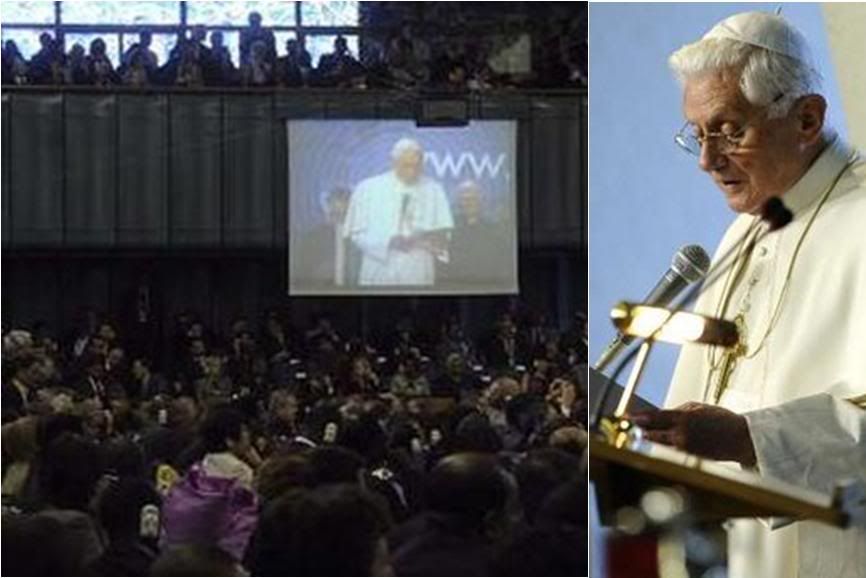
Calling hunger “the most cruel and concrete sign of poverty,” Pope Benedict XVI today told a special summit of the United Nations Food and Agriculture Organization that “opulence and waste are no longer acceptable when the tragedy of hunger is assuming ever greater proportions.”
The Pontiff called for urgent action to combat world hunger, to protect the global environment and to rethink lifestyle choices in the West in his address to the Food and Agriculture Organization, which is based in Rome.
Benedict’s decision to visit the Rome headquarters of FAO, rather than to insist that participants in the summit travel across town to the Vatican to be received in audience, was seen as a sign of the importance the Pontiff attaches both to the issue of hunger and to the institution of the United Nations.
According to statistics collected by FAO, the global economic crisis and a spike in food prices in parts of the developing world have driven the number of hungry people in the world from 800,000 five years ago to more than one billion today.
In his address to the FAO summit this morning, United Nations Secretary General Ban Ki Moon said that some 17,000 children die of hunger every day.
Speaking in French, Benedict XVI said the underlying problem isn’t a lack of food, echoing a point frequently made by development experts and anti-hunger activists.
“Sufficient food is produced on a global scale to satisfy both current demands and those in the foreseeable future,” the pope said. What’s missing, the Pope said, is instead “a network of economic institutions capable of guaranteeing regular access to sufficient food and water.”
In particular, Benedict insisted “there is no cause-and-effect relationship between population growth and hunger” – an indirect reply to critics of the church’s ban on contraception, which is sometimes blamed for impeding efforts to limit population growth.
The Pontiff asserted that “food and access to water” [are] “universal rights of all human beings, without distinction or discrimination.” Those rights, the Pope argued, take on meaning as part of a network of rights “beginning with the primary one, the right to life.”
Benedict asserted a clear link between hunger and environmental degradation.
“Protection of the environment challenges the modern world to guarantee a harmonious form of development, respectful of the design of God’s creation and therefore capable of safeguarding the planet,” the pope said.
“The links between environmental security and the disturbing phenomenon of climate change need to be explored further,” Benedict said, “focusing on the central importance of the human person, and especially of the populations most at risk from both phenomena.”
The Pope also called for a change in lifestyles in rich countries, in the direction of greater simplicity, less conspicuous consumption, and more solidarity with the poor.
“Norms, legislation, development plans and investments are not enough,” he said. “What is needed is a change in the lifestyles of individuals and communities, in habits of consumption and in perceptions of what is genuinely needed.”
Insisting that feeding hungry people is a moral imperative that “brooks neither delay nor compromise,” the Pontiff pledged that “the Catholic Church will always be concerned for efforts to defeat hunger.”
Despite the Pope’s strong words, the FAO summit does not appear likely to approve any new financial commitment from developed nations to attack hunger. Instead, the summit endorsed a five-point program this morning calling for greater “national, regional and global coordination” of anti-hunger resources.
Given that hunger tends to be especially acute in the global South, it’s an issue destined to attract a growing share of Catholic interest. Of the roughly 1.2 billion Catholics in the world today, some 720 million, or two-thirds, live in the southern hemisphere, making hunger a top-shelf pastoral priority for Catholic bishops, clergy and lay activists in those regions of the world.
If only all the climate-change breastbeaters paid a fraction of their lip service - and investment - in meaningful ways to combat world hunger as they do to bringing down greenhouse gases RIGHT NOW, without the cooperation of the world's two most populous nations!
The AP report includes an important substantive vote taken by the summit before the Pope even spoke:
Food summit turns down
UN funding appeal
By FRANCES D'EMILIO

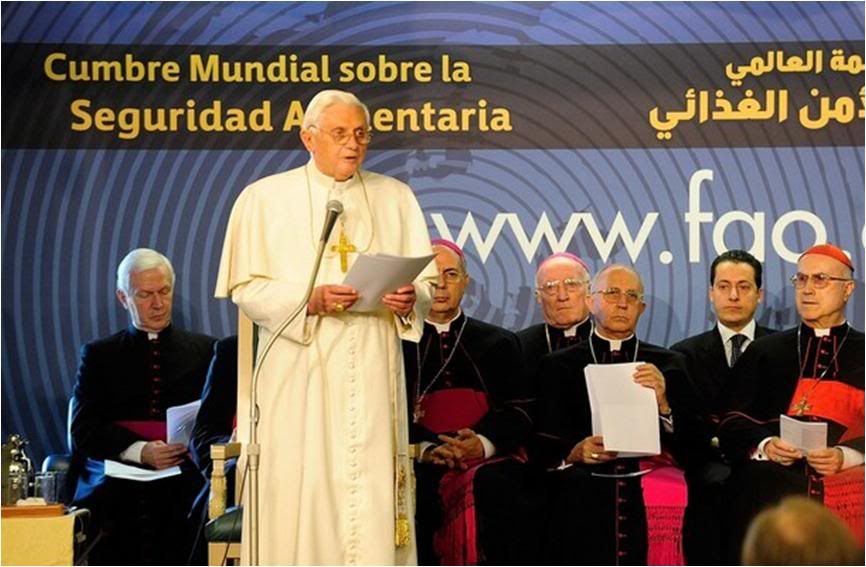
ROME, Nov. 16 (AP) – Pope Benedict XVI decried the worsening plight of the world's 1 billion hungry on Monday, as a United Nations food summit rallied around a strategy of more help to farmers in poor nations but rebuffed a U.N. appeal to commit billions to the plan.
In a show of broad consensus, some 60 heads of state and dozens of ministers from other nations pledged to substantially increase aid to agriculture in developing nations to help them become more self-sufficient in food production.
The world's wealthiest nations put forward the strategy at the Group of Eight summit this summer in L'Aquila, Italy.
Despite endorsing the strategy in the first hours of Monday's meeting,
the 192 participating countries did not commit to the $44 billion a year for agricultural aid that the U.N. Food and Agriculture Organization says will be necessary in the coming decades.
Soon after the delegates approved the declaration, Pope Benedict took the floor to decry "opulence and waste" in a world where the "tragedy" of hunger has been steadily worsening.
Benedict's speech marked the first time a Pontiff attended such a gathering since Pope John Paul II took part in a 1996 food summit.
The Pontiff, lending his moral authority as head of the world's 1 billion Catholics, also called for access to international markets for products coming from the poorest countries, which he said are often relegated to the sidelines.
The Pope urged delegates to keep the "fundamental rights of the individual" in mind when shaping new agricultural strategy. People are entitled to "sufficient, health and nutritious food" as well as water, he said.
Heads of state in attendance include Brazil's President Luiz Inacio Lula da Silva to Libyan leader Moammar Gadhafi. The U.S. delegation is headed by the acting administrator of the U.S. Agency for International Development Alonzo Fulgham.
The U.N. agency, which is hosting the three-day summit at its Rome headquarters, had also hoped countries would adopt 2025 as a deadline to eradicate hunger. But the declaration instead focused on a pledge set nine years ago to halve the number of hungry people by 2015.
As the conference opened, the United Nations' chief urged rich and powerful countries to tackle "unacceptable" global hunger.
"The world has more than enough food," U.N. Secretary-General Ban Ki-moon told delegates. "Yet, today, more than 1 billion people are hungry. This is unacceptable."
So far, helping the world's hungry has largely entailed wealthy nations sending food assistance rather than technology, irrigation help, fertilizer or high-yield seed that could assist local farmers, livestock herders and fishermen. Much of this food assistance is purchased from the wealthy nations' own farmers.
But the Food and Agriculture Organization says the best way to stop hunger is to help the needy help themselves, and the final declaration agreed to do that.
This approach "lies at the core of food security," Ban said.
"Our job is not just to feed the hungry, but to empower the hungry to feed themselves."
The summit is being held at a time "when the international community recognizes it has neglected agriculture for many years," the organization said Sunday. "Sustained investment in agriculture — especially small-holder agriculture — is acknowledged as the key to food security."
The gathering hopes to build momentum on a shift toward more aid to agriculture that was first laid out at the G-8 summit in July, during which leaders of the developed nations pledged to spend $20 billion in the next three years to help farmers in poor countries.
